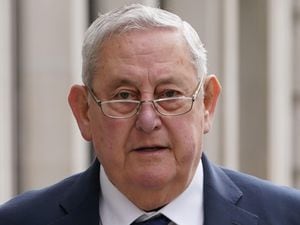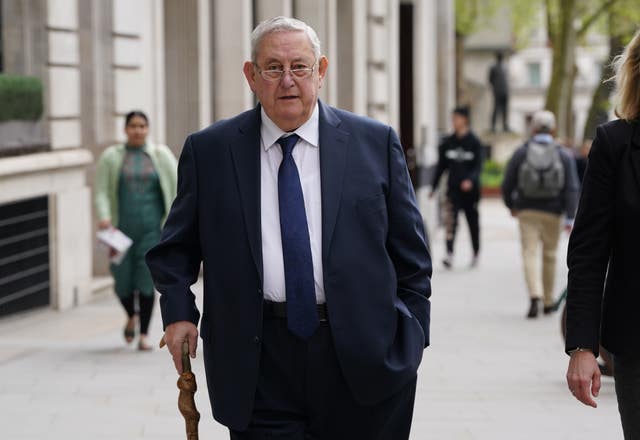Reconsidering Horizon would have put Post Office in ‘crisis mode’, says ex-boss
Former chief executive David Mills said he had not been made aware of complaints about the defectiveness of the accounting software.

The Post Office would have been in “crisis mode” if it had been forced to reconsider the Horizon system, the organisation’s former chief executive has said.
David Mills told the Post Office inquiry he had not been made aware of complaints about the defectiveness of the Horizon accounting software, and said he only became aware the organisation was a prosecuting authority towards the end of his tenure.
He told the hearing that “not a high level” of focus was placed on the prosecution of subpostmasters at board level, but agreed with the inquiry’s chairman that it should have been at the “forefront” of the minds of the board of directors.

During the former chief executive’s evidence, Tim Moloney KC, who represents a number of subpostmasters affected by the scandal, asked Mr Mills: “If the Post Office had been forced to go back to the drawing board on its online accounting system, the business was in real trouble wasn’t it?”
Mr Mills replied: “Sorry?”
Mr Moloney clarified: “The business was in real trouble?”
Mr Mills said: “Definitely, crisis mode it would have been in.”
The company’s former chief operating officer, David Miller, also gave evidence on Tuesday and denied being the architect of a “horrendous” plan to target the pensions of fraud-accused subpostmasters.
The inquiry heard Mr Miller attended a December 2004 board meeting in which he was assigned the task of ensuring “that the pensions of fraudsters were targeted to help ensure the company was reimbursed”.
Mr Miller also denied likening Horizon system developers Fujitsu to a “man who had just shoved 15 inches of bayonet up my posterior”.
He was quoted in a September 2010 PowerPoint presentation which also said leaders of the organisation felt they had been “shafted” by the Government and the company then known as ICL Pathway.
The document, which was prepared by former IT programme manager and head of automation Dave Smith, said the agreement with the technology giant had been signed with a “gun pointed at the head” of the Post Office.
During his evidence, Mr Mills said he could not recall a time when the prosecution of subpostmasters was discussed by the board.

Counsel to the inquiry Sam Stevens asked: “Why do you think that is? Do you think that’s a failing on the board’s part?”
Mr Mills replied: “No, I don’t.”
Asked why, the former chief executive said: “Because you have to put yourself in that time – I can see why it should have done now, but it didn’t then.”
Mr Mills said when he first came into the role of chief executive, he wanted to reduce the cost of the Horizon system in order to help keep the Post Office afloat.
He said: “We were paying well above what you could have expected … so I basically said ‘we must reduce the cost of Horizon – at the same time, we must begin to think now about how are we going to replace it within the contractual term’.”
Mr Mills also said he was not aware the company had developed a process to respond to challenges related to the system as the issues “never came to the board”.
Mr Stevens said: “Can you explain why as chief executive you weren’t aware of that?”
Mr Mills told the inquiry: “Despite efforts to understand and realise what was going on with Horizon, actually out in the field, issues of the nature that you’re discussing never came to the board, and in order to come to the board it would have had to gone through the directors or the executives and none of those ever raised it with me at all.”
Chairman Sir Wyn Williams said: “I’m not for a minute going to suggest that rescuing the Royal Mail Group and or the Post Office from insolvency was not critically important, I follow that.
“But exercising the function of prosecuting people has various consequences and reduced to its simplest, it means that you take people to court and in certain circumstances, very severe sanctions are imposed upon them.
“It does seem to me, I have to say, that that is something that the board of directors of a major company should have very much towards the forefront of its mind, regardless of what other problems it faces, is that fair?”
Mr Mills said: “Yes.”
Addressing whether or not he had been made aware of the defectiveness of the Horizon system, Mr Mills said in his witness statement: “To be clear, whilst at the Post Office, I was not made aware of complaints to the effect that Horizon was compromised.
“I could not therefore be concerned by the nature or frequency of allegations made by subppostmasters that Horizon was defective.
“I wish to state that had I been aware of such a situation, I would have acted to investigate and remedy such complaints.”
The Post Office has come under fire since the broadcast of ITV drama Mr Bates vs The Post Office, which put the Horizon scandal under the spotlight.
More than 700 subpostmasters were prosecuted by the Government-owned organisation and handed criminal convictions between 1999 and 2015 as Fujitsu’s faulty Horizon system made it appear as though money was missing at their branches.
Hundreds of subpostmasters are awaiting compensation despite the Government announcing that those who have had convictions quashed are eligible for £600,000 payouts.





